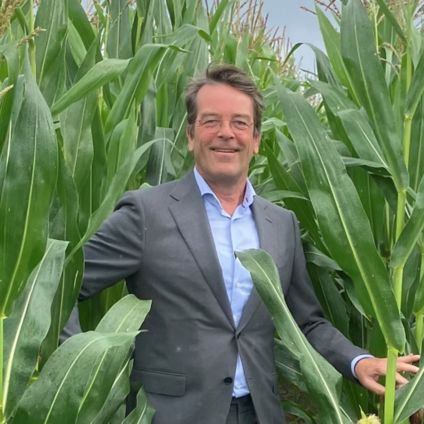KPMG helps Royal Brokking Group
Royal Brokking Group, a long-standing family business with a rich history spanning over a century in the agricultural industry, holds a prominent position in fertilizer trading and animal feed ingredients production. The animal feed process uses, amongst others, former food streams such as bread, chocolate or potato chips to turn this into animal feed ingredients, a very sustainable way of production.
Recently appointed CEO Sjoerd Schaafsma of Brokking Group has set out to establish the company as a front-runner in sustainability within the agricultural B2B market. To realize this vision, Schaafsma sought the help of KPMG.
Sjoerd Schaafsma states, "At Brokking, our sustainability journey commenced in 2020 with the introduction of key performance indicators (KPIs) tied to our Sustainability-Linked Loans. Working with KPMG on this project in 2024 and 2025 elevated us to the next level by identifying our most critical sustainability concerns and formulating an ambitious decarbonization strategy."
Why did Royal Brokking Group choose KPMG?
Brokking's motivation for engaging KPMG was driven, in part, by compliance requirements such as the European regulation CSRD, requiring a practical and actionable strategy. Brokking has multiple entities with varying business models and maturity levels. “For instance, our fertilizer wholesale business manages substantial volumes during peak seasons, while the animal feed business has more to do with daily production dynamics. Both are highly price-sensitive", Schaafsma explains. “Harmonizing the need for a practical and unified ESG strategy was quite a challenge.”
With KPMG's guidance, we established clear objectives, such as trying to increase the circular content in our animal feed segment—a feat not viable in the fertilizer market due to the absence of ‘circular fertilizer’.
This Sustainability Strategy is realistic and achievable, while making a significant step forwards

The approach
Brokking's collaboration with KPMG consisted of two parts: developing a Sustainability Strategy aligned with the CSRD and formulating a greenhouse gas (GHG) emissions reduction plan.
Crafting a Sustainability Strategy in Alignment with the CSRD
The initial stage involved pinpointing the most important ESG topics. Robin Claushuis, the KPMG ESG project manager, explains, "By conducting a double materiality assessment, Brokking identified critical topics that needed to focus in reporting efforts." Out of a comprehensive list of 130 subjects, 13 crucial topics emerged through practical and at times entertaining workshops with the company's leadership.
Within the environmental purview, Brokking's main focus centered on curbing greenhouse gas emissions (details in the subsequent section) and increasing the utilization of waste streams. An interesting fact is that Brokking as a market leader in using dry former food streams is seeing increasing demand from other parties who also want to buy waste streams to reduce emissions.
Within the social domain, safety is of course an important topic. Brokking has been working on preventing accidents for years, in line with its core value of ‘Betrouwbaar’ (reliable). The topic of safety as well as other social topics required specific KPI and reporting requirements. KPMG supported this by developing a pragmatic roadmap as well as solutions around reporting manuals and controls to strengthen the implementation.
In terms of governance, Brokking observed that, vis-à-vis entities like insurance firms, the number of material subjects was relatively small. KPMG's analysis underscored that key issues, such as fraud, were well addressed through extant policies and processes. This comprehensive evaluation empowered Brokking to focus its Sustainability Strategy on the most critical areas.
GHG Emission Baseline and Reduction Blueprint
Collaborating with KPMG, Brokking embarked on establishing a GHG baseline. Melvin Gale, GHG specialist at KPMG, elaborates, "Leveraging various databases and internal insights, we calculated emissions stemming from sources like natural gas usage in fertilizer production and livestock emissions—forming a robust baseline."
Key Phases from Baseline to Reduction Plan:
- Identifying reduction measures; after the baseline was confirmed, various measures were identified and scored on technical as well as financial feasibility and reduction potential.
- The reduction ambition was discussed in a workshop with Brokking’s leadership, based on CSRD and Science-Based Target initiative Guidelines (SBTi)
- Scenarios were developed and discussed, for instance, a scenario where the fertilizer division would ‘deliver’ less emission reduction; how much extra could the animal feed ingredients cover by investing in deforestation-free soy?
- The reduction strategy was approved and the roadmap was transferred to the various business owners.
Key Takeaways
The collaboration with KPMG not only yielded the first Sustainability Strategy but also valuable insights into the importance of incremental change. “One of the most important lessons we learned is that we have the tools available to use different levers to achieve our reduction results”, Schaafsma says. “This Sustainability Strategy is realistic and achievable, while making a significant step forwards.”
Claushuis adds, “Both Brokking and KPMG gave this project the right priority, allowing us to build a strong collaboration, for instance, visiting factories together. This was critical to the project’s success. The management teams of the operating companies Triferto and FeedValid were also instrumental in the successful delivery of this project."
Results
The results of the collaboration between Brokking and KPMG are clear. Brokking has a CSRD-proof Sustainability Strategy and, in line with the SBTi, will reduce their Scope 3 emissions by 30% (a reduction in Scope 3 of approximately 700.000 tons of CO2 emissions by 2030).
On Scope 1 and 2, a pragmatic approach has been chosen; the SBTi requires a 42% reduction in 2030, but due to net congestion, it is not possible to achieve this in the Brokking factories. Hence, the goal is to reduce the fossil fuel usage in 2035, reaching 90%. A reduction of approximately 11% is planned until 2035 using, for instance, HVO transport instead of regular diesel.
The roadmap crafted with KPMG, coupled with enhanced organizational awareness, will support the execution of the Sustainability Strategy. Brokking's adoption of its consolidation package Tagetik as an IT platform for centralized ESG data management underscores its commitment to robust reporting practices.
Matthijs Venema, Group Controller, asserts, "KPMG's guidance in defining reporting parameters, now trackable on Tagetik, has improved our ability to supply stakeholders with consolidated, transparent reporting."
The collaboration with KPMG
Both parties consider the partnership highly successful. “KPMG not only demonstrated their expertise but also took the time to thoroughly analyze the situation before proposing solutions”, Schaafsma says. “Then, together, we rolled up our sleeves and got to work. The journey we’ve taken, crafting a Sustainability Strategy in summer to a full GHG reduction plan by Christmas is remarkable.”
KPMG helps
Inspired by Royal Brokking Group‘s story? Find out how KPMG‘s Sustainability services can help your organization.




